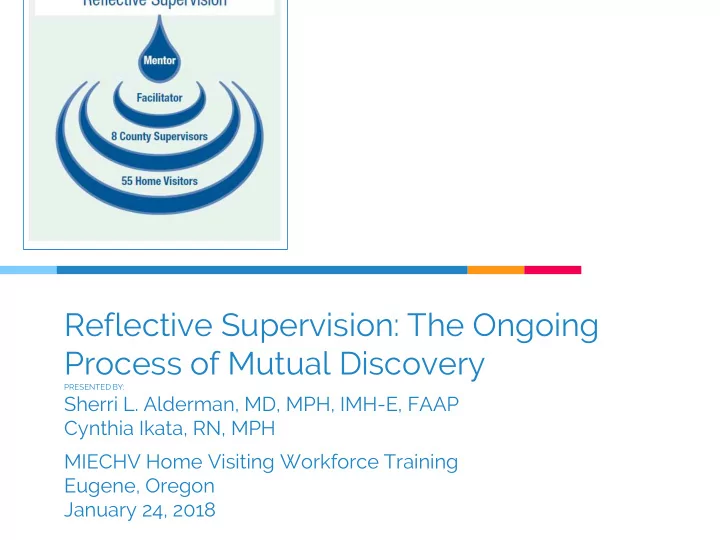

Reflective Supervision: The Ongoing Process of Mutual Discovery PRESENTED BY: Sherri L. Alderman, MD, MPH, IMH-E, FAAP Cynthia Ikata, RN, MPH MIECHV Home Visiting Workforce Training Eugene, Oregon January 24, 2018
Goals and Objectives: At the conclusion of this presentation, attendees will be able to: ▷ Define reflective supervision ▷ Name 1 characteristic of reflective supervision that distinguishes it from administrative and clinical supervision ▷ Describe 1 reflective supervision strategy
Oregon Home Visiting Core Competencies: ▷ Professional Best Practices ▷ Professional Well Being
Infant Mental Health Endorsement Core Competencies: ▷ Reflection self-awareness emotional response parallel process
Agenda ▷ Reflection Activity ▷ Introductions ▷ Defining Reflective Supervision ▷ Theoretical Framework for Reflective Supervision ▷ Key Strategies of Reflective Supervision ▷ Demonstration ▷ Discussion ▷ Action Plan
Reflection Activity What is your experience with reflective supervision? What 1 word captures what reflective supervision is for you?
Introductions Please share your name, your agency, and the name of your home visiting program. Please also share your 1 word that captures what reflective supervision is to you.
1. Defining Reflective Supervision What it is AND what it is not
Types of Supervision ▷ Administrative ▷ Clinical ▷ Reflective
Types of Supervision ▷ Administrative Policies, practices, and procedures ▷ Clinical Case presentations, problem-solving, guidance and recommendations ▷ Reflective
“ Reflective supervision is “a collaborative relationship for professional growth that improves practice by cherishing strengths and partnering around vulnerabilities to generate growth” Shahmoon-Shanok 1991 Wisconsin Alliance for Infant Mental Health 2017
“ “Through this way of being, a holding environment is created — an emotional breathing space — where it is safe to explore accomplishments, insecurities, mistakes, questions, and different approaches to working with young children and their families.”
Reflective Supervision is: ▷ Relationship-based ▷ The process and practice of exercising a capacity to question first impression explore the work filtered through the perspectives of all involved (self, child, family, colleagues) ▷ Honors the meaning of internal experiences as worthy of time to pause, contemplate, and explore Heffron and Murch 2010
Reflective Supervision: ▷ Facilitates empathy open-mindedness collaboration respect ▷ Fosters meaningful and productive connections with parents, children, and colleagues Heffron and Murch 2010
Reflective Supervision IS NOT: IS: ▷ ▷ Hierarchical Collaborative relationships ▷ Just listening ▷ Active dialogue ▷ ▷ Therapy Exploration of thoughts & feelings only in the context of the work at hand ▷ Thinking more creatively & honestly about very complex situations ▷ Has limits in scope ▷ May be need for redirection or ▷ Only useful for additional outside resources inexperienced staff Heffron and Murch 2010
“ The work is too important and too complex to do alone. Heffron and Murch 2010
Reflective Supervision is a process of: ▷ Recognizing the multidimensional complexity of the work ▷ Building on the strengths and skills that each individual brings to the relationships ▷ Discovering opportunities for rejuvenation, repair, and professional growth ▷ Nurturing greater engagement and trust in relationships
2. Theoretical Framework for Reflective Supervision
“ The work involves “the interlocking network of relationships between supervisor, supervisee, family, and child.” Heffron and Murch 2010
Parallel Process Do unto others as you would have them do unto others.
Reflective Supervision is a parallel process: ▷ The experience that a staff person has with her supervisor can affect the way she interacts with a family. ▷ The way the staff person interacts with the child, parent, or colleague can positively spill over and influence the parent’s relationship with her child Heffron and Murch 2010
Reflective Supervision is a parallel process: ▷ All human development occurs in a nonlinear, dynamic manner ▷ Reflective supervision is nonlinear and dynamic Heffron and Murch 2010
Reflective Supervision is a parallel process: ▷ Supervisor and supervisee share their thoughts, feelings, and reactions in order to reach a better understanding of the work and to collaborate more effectively ▷ Supervisor’s attunement and sensitivity help supervisee regulate Heffron and Murch 2010
Reflective Supervision is a parallel process: ▷ Feelings matter ▷ Willing and able to deal with conflict, to discuss topics, and hold intense feelings ▷ Uncovering and recognizing potential ▷ Exploring mistakes, ineffective choices, and misconceptions in ways that eventually lead from self-condemnation to self-forgiveness and acceptance ▷ Relationship-based Heffron and Murch 2010
3. Key Strategies of Reflective Supervision
Reflective Supervision Strategies for Home Visitors ▷ Attunement/mindfulness ▷ Pace ▷ Containment ▷ Sorting and selecting Heffron and Murch
Reflective Supervision Strategies ▷ Perspective ▷ Gentle inquiry ▷ Professional use of self Heffron and Murch
Reflective Supervision Strategies ▷ Negative capability (listen, learn before speaking) ▷ Parallel process ▷ Raising concerns (readiness for growth) ▷ Track patterns (emerging themes) Heffron and Murch
4. Demonstration
The Reflective Cycle Gibbs f1988
5. Discussion
Action Plan What is your current skill level providing reflective supervision? What do you need to maintain or grow? What ways can you think of to pursue meeting your needs?
Thank you! Sherri L. Alderman sherri.alderman23@gmail.com Cynthia Ikata cynthia.ikata@dhsoha.state.or.us
REFERENCES ▷ Gibbs G (f1988). Learning by doing: A guide to teaching and learning methods, Oxford, UK: Brookes University. ▷ Heffron M-C, Murch T (2010). Reflective supervision and leadership in infant and early childhood programs, Washington, DC.: Zero to Three. ▷ Shahmoon-Shanok R (1991). The supervisory Relationship: Integrating, resource and guide, Zero to Three Journal 12(2), 63-76. ▷ Wisconsin Alliance for Infant Mental Health (2017). Demistifying reflective practice: Defining reflective supervision and consultation for infant and early childhood professionals, Retrieved from http://wiaimh.org/wp- content/uploads/2014/02/Reflective-Practice- Guidelines-FINAL.pdf, Accessed December 20, 2017.
Recommend
More recommend